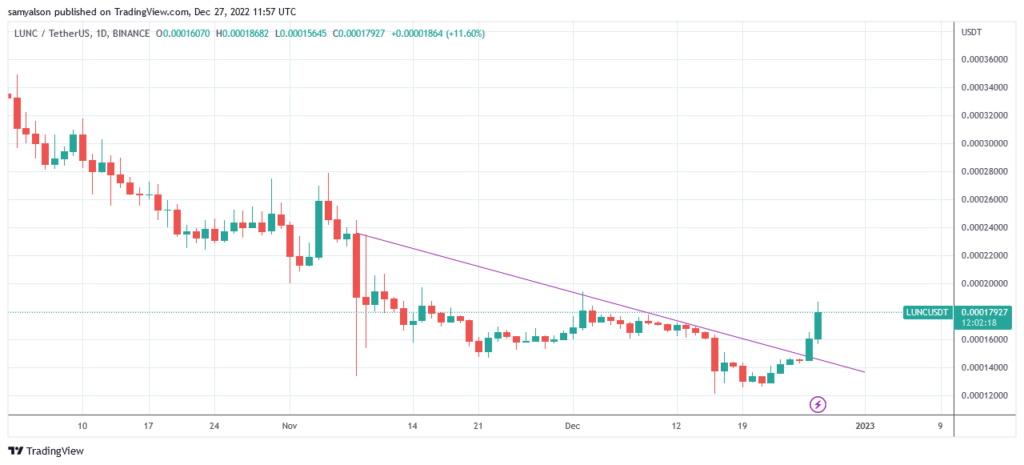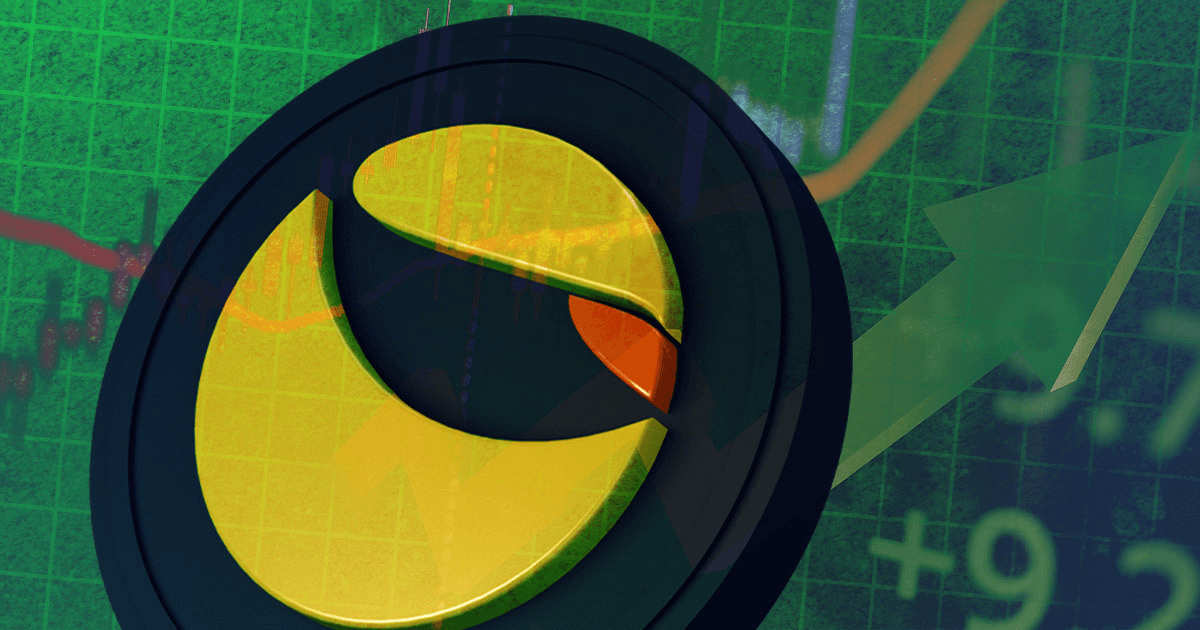Terra Classic (LUNC) surged over Boxing Day, triggering a market cap spike above $1 billion.
A local bottom in market cap valuation was found at $763 million on Dec. 21. Since then, buying activity has led to an uptrend that accelerated into a sharp, near-vertical movement on Dec. 26.
The spike peaked at $1.09 billion, with profit taking causing a slight drop in valuation to $1.07 billion as of press time.
The previous few weeks saw Terra Classic’s market cap move above and below the $1 billion threshold level on several occasions. The last dip below $1 billion occurred on Dec. 7.
Terra Classic
Analysis of the accompanying trend in Terra Classic token price showed Boxing Day’s price action decisively breaking a six-week downtrend.
The following day, on Dec. 27, bulls lifted the price to $0.00018775, marking a 25-day high.

However, zooming out showed LUNC is still in a macro downtrend and has been since relaunching in May.
Following the UST de-peg and subsequent Terra ecosystem implosion, the community accepted a proposal from founder Do Kwon to revive the chain.
This resulted in the Terra chain hard forking into two distinct chains, Terra Classic with the Luna Classic (LUNC) token, which is said to be community-led, and Terra 2.0 under the LUNA token.
A new proposal on the table
Back in September, LUNC was spiking hard off the back of proposals to revive the chain and restore its previous standing. This included token burning and attractive staking rewards.
Market cap valuations were boosted to approximately 12x of Terra 2.0, or $3.3 billion versus $258 million.
Three months on, and post-FTX collapse, Terra Classic’s revival ambitions have stalled amid wider market downtrends. Currently, its $1.07 billion market cap valuation is a little over 5x the size of Terra 2.0’s $180.9 million valuation.
To resuscitate LUNC’s revival, Associate Professor of Computer Science at Drexel University, Edward Kim, who is now involved with developing the chain, introduced Proposal 11168 – Joint L1 Task Force.
Kim called for funding to pay developers to “complete the required updates to upgrade and stabilize the L1 layer.”
Although budget restraints limit hiring the same structure as before the implosion, Kim said 2 full-time and 2 part-time devs could feasibly achieve the required improvements within his proposed three-month timescale.
“At the height of Terra, Terraform Labs had a team of 6-8 senior L1 blockchain developers. With this level of support, developers could focus on innovation in addition to security and maintenance.”
Read More: cryptoslate.com










 Bitcoin
Bitcoin  Ethereum
Ethereum  Tether
Tether  Solana
Solana  XRP
XRP  Dogecoin
Dogecoin  USDC
USDC  Cardano
Cardano  Lido Staked Ether
Lido Staked Ether  Avalanche
Avalanche  TRON
TRON  Toncoin
Toncoin  Stellar
Stellar  Wrapped stETH
Wrapped stETH  Shiba Inu
Shiba Inu  Wrapped Bitcoin
Wrapped Bitcoin  Polkadot
Polkadot  Chainlink
Chainlink  WETH
WETH  Bitcoin Cash
Bitcoin Cash  Sui
Sui  Pepe
Pepe  NEAR Protocol
NEAR Protocol  LEO Token
LEO Token  Uniswap
Uniswap  Litecoin
Litecoin  Wrapped eETH
Wrapped eETH  Aptos
Aptos  Hedera
Hedera  Internet Computer
Internet Computer  USDS
USDS  Cronos
Cronos  Ethereum Classic
Ethereum Classic  POL (ex-MATIC)
POL (ex-MATIC)  Bittensor
Bittensor  Render
Render  Artificial Superintelligence Alliance
Artificial Superintelligence Alliance  Ethena USDe
Ethena USDe  Arbitrum
Arbitrum  Filecoin
Filecoin  Celestia
Celestia  Dai
Dai  Algorand
Algorand  Stacks
Stacks  Bonk
Bonk  WhiteBIT Coin
WhiteBIT Coin  Cosmos Hub
Cosmos Hub